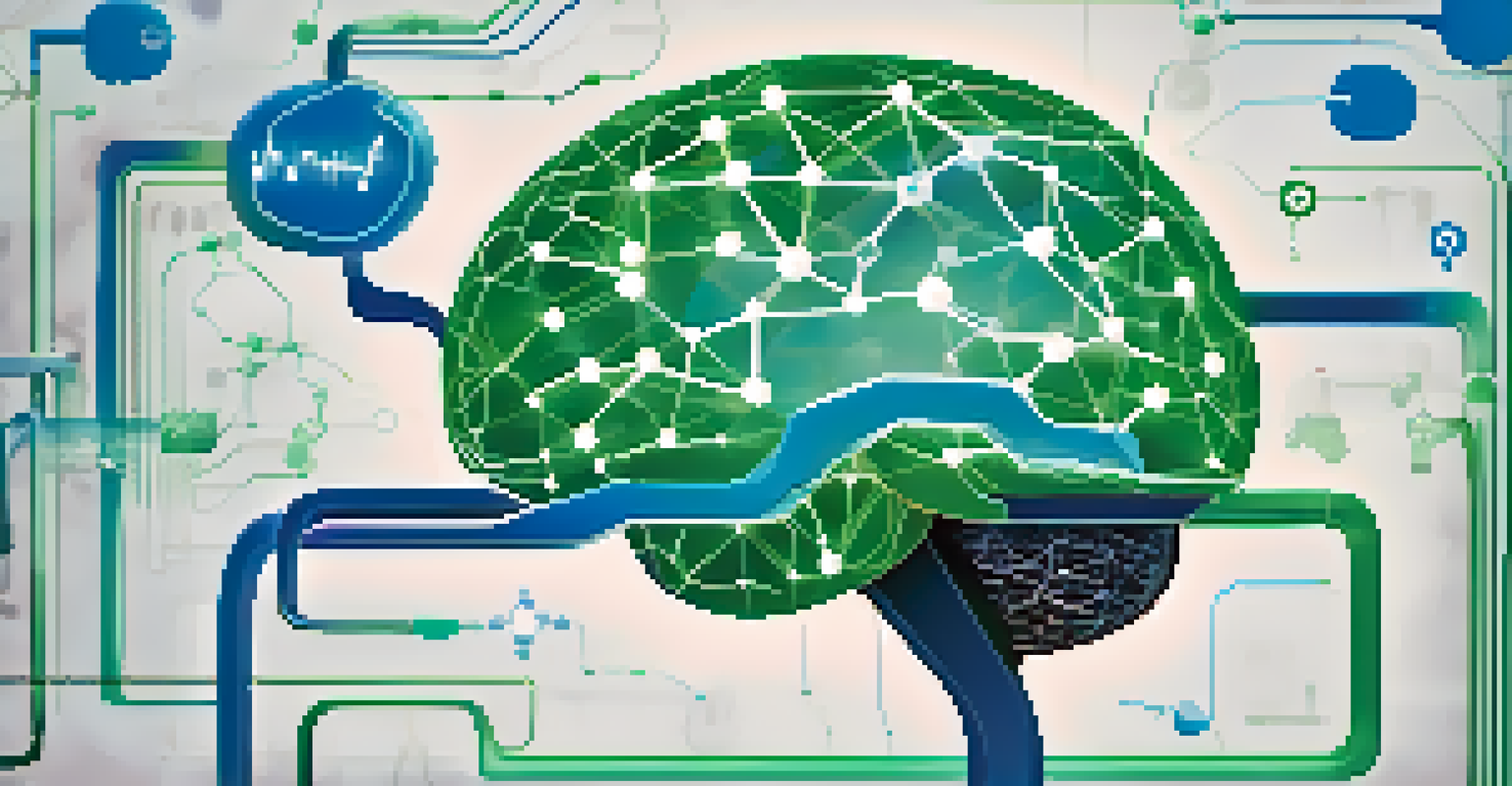Natural Language Processing: Transforming Medical Record Analysis

Understanding Natural Language Processing in Healthcare
Natural Language Processing, or NLP, is a branch of artificial intelligence that helps machines understand human language. In healthcare, NLP plays a crucial role in analyzing unstructured data found in medical records. This technology allows healthcare providers to extract valuable insights from patient notes, lab results, and other documentation, making it a game changer in medical data management.
The greatest benefit of NLP in healthcare is its ability to enhance patient care by identifying potential health risks early.
Imagine reading through thousands of patient files to find relevant information; this is where NLP shines. It can quickly sift through vast amounts of text, identifying key terms and patterns. This capability not only saves time but also reduces the chances of human error in data interpretation, which can be critical in a medical setting.
As the healthcare industry continues to grow, the need for efficient data analysis becomes more urgent. NLP addresses this need by providing tools that enhance the speed and accuracy of medical record analysis. By automating the processing of language data, healthcare professionals can focus more on patient care rather than paperwork.
The Role of NLP in Medical Record Documentation
Medical records often contain a wealth of information, but much of it is unstructured and difficult to analyze. NLP helps to convert this unstructured data into a structured format, making it easier for healthcare providers to access and utilize critical information. For example, NLP can categorize notes from doctors, summarize patient histories, and highlight important trends.

Consider a scenario where a physician is trying to track a patient's symptoms over time. Instead of manually reviewing countless records, NLP tools can pinpoint relevant entries and present them in a concise manner. This not only accelerates the review process but ensures that no vital information is overlooked.
NLP Enhances Healthcare Efficiency
Natural Language Processing streamlines the analysis of unstructured medical data, allowing healthcare providers to focus more on patient care.
Moreover, NLP can help standardize documentation across different healthcare systems. By implementing NLP, hospitals and clinics can ensure that patient information is consistently recorded, making it easier to share data and collaborate on patient care. This standardization is particularly important in improving the quality of care across different providers.
Enhancing Patient Care with NLP Insights
One of the most significant benefits of NLP in healthcare is its ability to enhance patient care. By analyzing medical records, NLP can identify potential health risks and alert providers to critical changes in a patient's condition. This proactive approach can lead to earlier interventions, ultimately improving patient outcomes.
Natural Language Processing is not just about understanding language; it's about transforming data into actionable insights for better health outcomes.
For instance, if a patient's notes indicate increasing symptoms of a chronic condition, NLP can flag this information for the healthcare team. By catching these trends early, providers can take action before the situation worsens. This not only benefits patients but also helps healthcare systems manage costs more effectively.
Additionally, NLP can assist in personalized medicine by analyzing individual patient data and suggesting tailored treatment plans. By understanding the nuances of a patient's medical history, healthcare professionals can make more informed decisions, leading to better health management and satisfaction.
Challenges and Limitations of NLP in Healthcare
While NLP offers numerous advantages, it is not without its challenges. One major limitation is the variability in medical language and terminology. Healthcare providers may use different terms or abbreviations for the same condition, which can confuse NLP algorithms. To overcome this, continuous training and refinement of NLP models are necessary.
Another challenge is ensuring the accuracy of the data extracted by NLP tools. If the algorithms misinterpret a term or context, it could lead to incorrect conclusions about a patient's health. This highlights the importance of human oversight in the process, as healthcare professionals must validate the insights provided by NLP.
NLP Improves Patient Outcomes
By identifying health risks and trends in patient records, NLP facilitates earlier interventions and personalized treatment plans.
Moreover, privacy and security concerns are paramount in healthcare. Medical records contain sensitive information, and any NLP system must comply with regulations such as HIPAA. Ensuring that patient data is protected while still allowing for effective analysis is a balancing act that healthcare organizations must navigate.
Future Trends in NLP for Medical Record Analysis
The future of NLP in medical record analysis looks promising, with ongoing advancements in technology. As machine learning models become increasingly sophisticated, we can expect even greater accuracy in interpreting medical language. This evolution will enhance the ability of healthcare providers to make data-driven decisions.
Additionally, the integration of NLP with other technologies, such as telemedicine and electronic health records, will further streamline processes. For instance, NLP could analyze patient interactions during telehealth visits, extracting insights that can inform follow-up care. This integration will not only improve efficiency but also enhance patient engagement.
We may also see the rise of more intuitive NLP applications that require minimal training for healthcare staff. As user-friendly interfaces become the norm, more providers will embrace these tools, leading to wider adoption and ultimately better patient care. The future of healthcare is undoubtedly bright with the continued evolution of NLP technologies.
The Role of NLP in Research and Clinical Trials
NLP is not only transforming the way healthcare providers analyze patient records, but it also plays a pivotal role in research and clinical trials. By processing large volumes of scientific literature and trial data, NLP can help researchers identify relevant studies and trends, ultimately accelerating medical advancements.
For example, NLP can analyze published research to detect emerging patterns in treatment efficacy or side effects. This insight can guide clinical trials, ensuring that they are designed with the most up-to-date knowledge. As a result, researchers can focus their efforts on the most promising avenues, enhancing the overall quality of healthcare research.
Challenges in NLP Adoption
Despite its advantages, NLP faces challenges such as language variability and data privacy, necessitating ongoing refinement and human oversight.
Furthermore, NLP can facilitate patient recruitment for clinical trials by matching potential participants with studies based on their medical history. This not only expedites the recruitment process but also helps ensure that trials are representative of diverse patient populations, leading to more generalizable results.
Conclusion: Embracing NLP for Better Healthcare Outcomes
In conclusion, Natural Language Processing is revolutionizing the analysis of medical records, making it an invaluable tool in modern healthcare. By improving efficiency, accuracy, and patient care, NLP has the potential to transform how providers manage and utilize medical data. Embracing this technology is not just an option; it’s becoming essential for healthcare organizations aiming to stay competitive.
As we look to the future, the continuous development of NLP will likely unlock even more possibilities in healthcare. From enhancing research to streamlining clinical processes, the benefits are vast and varied. The integration of NLP into everyday medical practices is paving the way for a more data-informed approach to patient care.

Ultimately, the goal of healthcare is to improve patient outcomes, and NLP is a crucial piece of that puzzle. By harnessing the power of language processing, healthcare providers can make more informed decisions, leading to healthier lives and stronger communities.